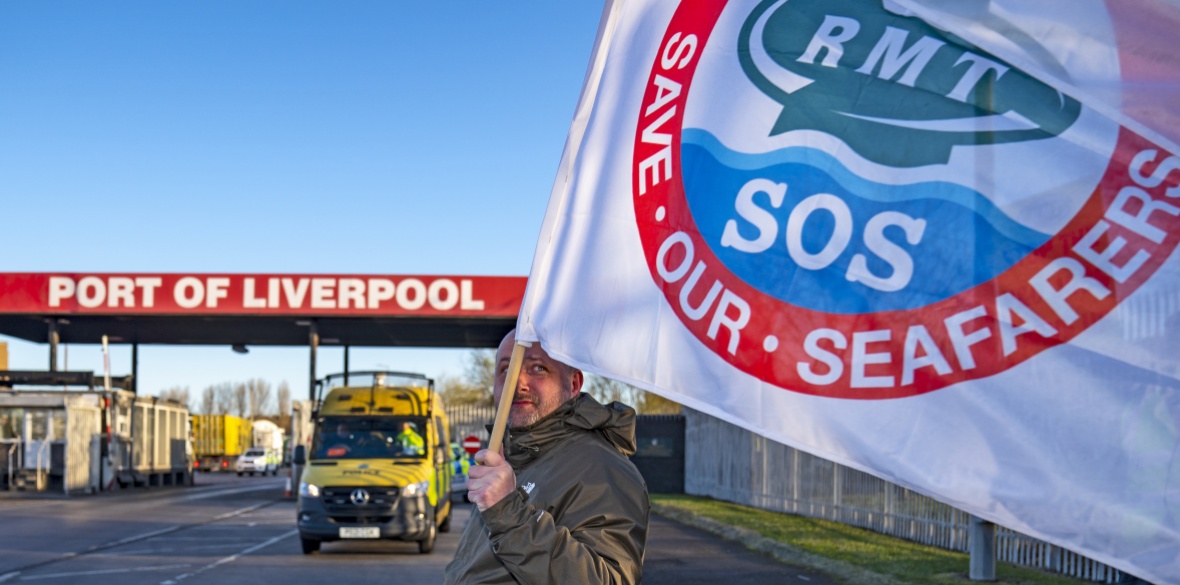ROGUE ferry operator P&O’s illegal mass sacking of seafarers two years ago exposed how feeble workers’ rights in Britain have become.
Despite a flurry of cosmetic outrage from Tory ministers at the time, they have done nothing to deter employers from copying P&O by dismissing workers en masse to replace them with cheaper labour, and have further undermined workers’ rights through draconian anti-strike legislation.
There are few clearer examples of the impunity granted to corporate crooks than the P&O scandal.
Boss Peter Hebblethwaite actually admitted in Parliament that the firm knew it was behaving illegally when it sacked 786 seafarers by video link (claiming that they were being made redundant, though they were in fact being replaced) and then had them escorted off their ships by masked goons.
P&O simply calculated that the cost of breaking the law would be outweighed by the higher profits it could make by hiring foreign workers on less than the minimum wage (and indeed, its parent company DP World announced a 50 per cent increase in profits in the first half of 2022). So useless are the deterrents to corporate law-breaking in Britain that he even blandly told MPs he would do it again.
The Insolvency Service later announced that there would be no criminal proceedings against P&O because there was “no realistic prospect of a conviction” — though its chief executive had publicly acknowledged the company’s guilt.
The message to other employers is that they can get away with “fire and replace” tactics to force workers onto worse contracts.
The dismissal of skilled, professional staff and their replacement by workers on lower pay has been a strategic goal in companies beyond seafaring, such as Royal Mail. Although the Communication Workers Union defeated the immediate threat to posties’ jobs through its 2022-23 strike, which secured an agreement not to impose compulsory redundancies until at least 2025 and a ban on outsourcing, this was only a partial victory and threats to jobs have been resurrected through Ofcom proposals to rip up the universal service obligation and reduce delivery days.
A tight labour market and the 2022-23 strike wave by increasingly militant unions are the main reasons fire-and-replace has not become more common since the P&O mass sacking. And the company’s shocking behaviour was one of the provocations that inspired that fightback.
Today, we see a similarly contemptuous attitude from Tata Steel, which plans to make thousands of steelworkers redundant despite receiving half a billion pounds’ subsidy for its transition to an electric arc furnace at Port Talbot. As with shipping bosses’ preference for cheap foreign labour — which has driven a decline in British seafaring jobs — the deliberate wrecking of the steel industry will lead to a permanent loss of skills.
Both show that corporate profits trump the interests of workers, communities and even strategic sectors of the economy. The need to counter them with sustained industrial resistance is as great as it was when the strike wave began, but maintaining that level of militancy is proving increasingly difficult — while the new anti-strike laws are designed to stop workers defending themselves.
The best means of driving pay and conditions back up is through sectoral collective bargaining. The government’s Seafarers’ Welfare Charter is toothless, since it isn’t mandatory, and while Labour promises a new deal for workers, it has reduced its commitment on sectoral bargaining to one sector (social care), while despatching Rachel Reeves and Angela Rayner to reassure business leaders that they will have a say on the pace and implementation of reforms, according to the Financial Times.
But proper penalties for abusing workers’ rights matter too — directors who face jail time for breaking the law are much less likely to see doing so as nothing but a business cost worth risking because of the profits to be gained, as P&O did.









